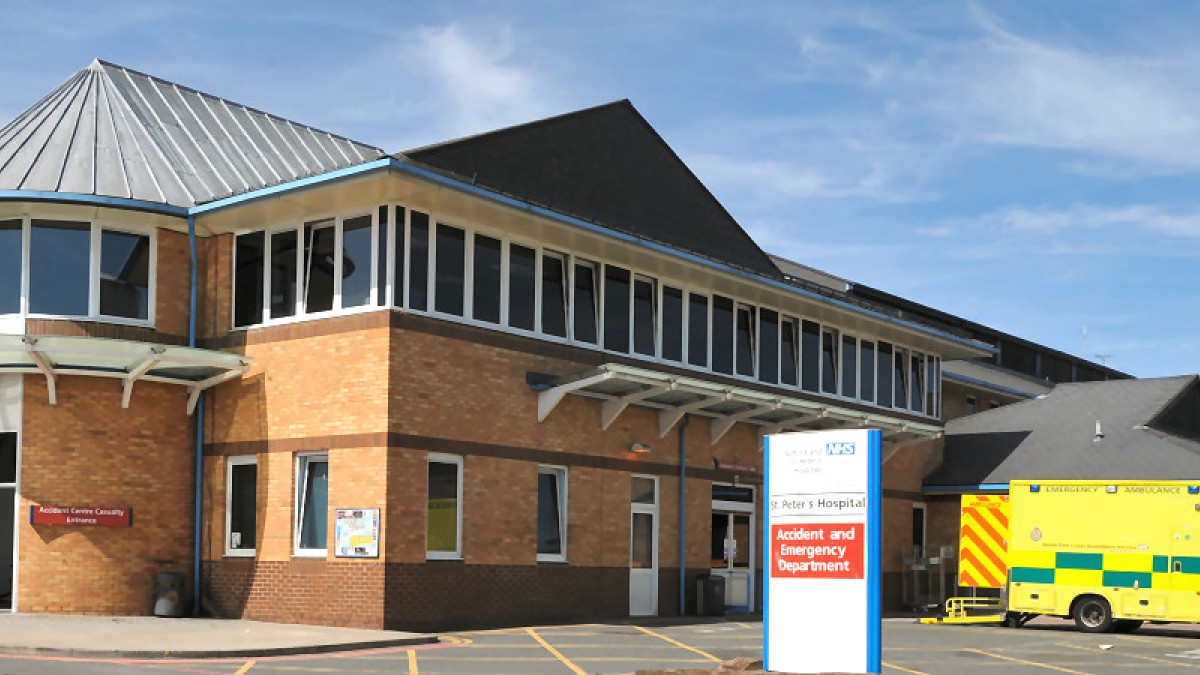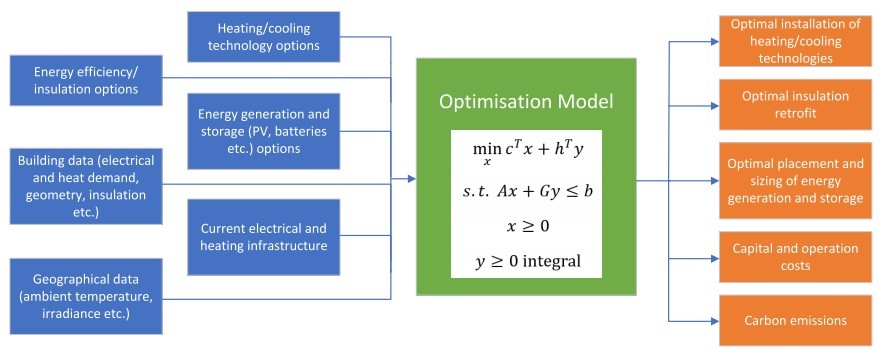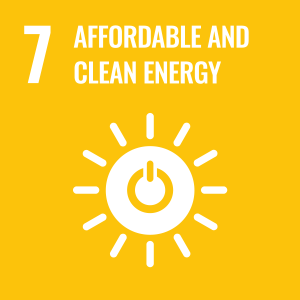Decarbonising NHS Hospitals: Strategic Sustainability Planning for Hospital Sites
Led by Dr Michael Short, the project focused on developing a methodology to inform carbon reduction planning for Ashford and St. Peter’s Hospitals NHS Foundation Trust (ASPH), using detailed analysis of energy usage data and stakeholder survey to identify opportunities for improved sustainability. The project addresses the United Nations Sustainable Development Goals (UN SDGs) SDG 7, SDG 8, SDG 9, SDG 11, SDG 12, and SDG 13.
The Challenge
In 2023 the Institute for Sustainability launched its first-ever Innovation Contest to strengthen collaboration between external organisations and Institute Fellows and to create opportunities for co-developing innovative and sustainable solutions. As one of the participating organisations, Ashford and St. Peter’s Hospitals NHS Foundation Trust (ASPH) proposed a challenge focused on reducing energy use and carbon emissions across its hospital sites, in line with the NHS’s Carbon Net Zero goals. Dr Michael Short, Dr Mona Chitnis and the team won the challenge and developed a set of recommendations based on stakeholder survey and detailed analysis of energy usage data from the St. Peter’s Hospital site.
Ashford and St Peter’s Hospitals NHS Foundation Trust (ASPH) serves a population of more than 410,000 people living in the boroughs of Runnymede, Spelthorne, Woking and parts of Elmbridge, Hounslow, Surrey Heath and beyond. The Trust employs around 4,800 individual members of staff. The Trust provides a whole range of services across its hospital sites. The majority of planned care, like day case and orthopaedic surgery and rehabilitation services, is provided at Ashford Hospital, with more complex medical and surgical care and emergency services at St Peter’s Hospital.

Our approach
NHS carbon emissions account for approximately 4% of England’s total carbon footprint and more than 40% of all public services’ carbon footprint. Less than a quarter of the total NHS emissions are part of the NHS direct carbon footprint, which can be directly controlled; the remainder are associated with services and supply chains. The NHS aims to become Carbon Net Zero by 2045, and all NHS Trusts are required to have Green Plans in place to achieve these targets.
In line with NHS Green Plan, ASPH aims to reduce carbon emissions on their hospital sites. To support ASPH in developing cost-effective plans for carbon reduction, the research team proposed recommendations using two approaches:
1. Exploring options – Using a mathematical model to test different scenarios for how ASPH could manage its energy systems more efficiently,
2. Listening to staff – Running a survey to understand behaviours and perceptions of staff, trust members, and volunteers regarding sustainability practices across the hospital site.
Mixed-integer linear programming (MILP) optimisation model
For the modelling, multiple data sources from ASPH were fed into an optimisation model, including heating/cooling technology options, energy efficiency and insulation options, and current electrical and heating infrastructure. Using the model, the team proposed several low-carbon heating and cooling options, insulation retrofit strategies, as well as energy generation and storage technologies. The team also calculated the associated costs, return on investment, and whole-life carbon emissions of each option. With the suggested infrastructure improvements, the following potential benefits were highlighted:
- A large scale of economic savings was projected – it is estimated that annual operating costs could be reduced from £4.2M to £2.35M, with a capital outlay of an additional £35M over a 60-year lifetime.
- An 86% reduction in emissions is possible with the minimum-cost solution.
Figure 1. Inputs and outputs of the mixed-integer linear programming (MILP) optimisation model

Stakeholder survey
Through the stakeholder survey, the research team explored drivers and barriers influencing sustainable transport and behaviours across hospital sites. Participants were asked about their environmental awareness, commuting habits, environmentally friendly behaviours such as use of reusable products and energy-saving actions, and willingness to support ASPH’s Net Zero goals. The majority of respondents were current ASPH employees, with additional input from patients, volunteers, and members of the public. Based on the survey findings, the team proposed several enhancements to infrastructure and operational practices. These included addressing challenges related to transportation and EV charging infrastructure, as well as improving the visibility and accessibility of information about ASPH’s sustainability initiatives.
Using both approaches to understand the physical infrastructure as well as behaviours of the users of the environment enabled a holistic view in developing comprehensive and tailored recommendations to the client.
Dr Michael Short specialises in developing mathematical optimisation tools and software for optimal sustainable process design. His research revolves around applying mathematical modelling and optimisation techniques to support decision-making across diverse fields, including renewable energy, bioenergy, water and heat integration, reactor design, real-time optimisation of industrial processes and pharmaceuticals. Dr Short works closely with academic, government, and industry partners to translate research into real-world impact, while also advancing foundational work in algorithms for mathematical optimisation and surrogate modelling. Dr Mona Chitnis’s research focuses on the intersection of economics, energy and transport sectors, and environmental policy. She specialises in energy demand modelling, particularly understanding how consumer behaviour influences energy use and technology adoption. Her work also explores energy efficiency, rebound effects, and the economic implications of climate change mitigation strategies. Her expertise is in quantitative models, econometrics methods, surveys and data analysis and their application to her research field. Robert Steven is a postgraduate research student at the University of Surrey, specialising in developing and utilising optimisation models to understand energy systems. Tarokh Bahrdo is a Postgraduate research student at the University of Surrey, specialising in the application of econometrics methods and data analysis for energy and transport sector.
Next Steps
The outputs of the project provided valuable insights and recommendations for designing carbon reduction strategies across ASPH hospital sites. It also marked the beginning of a collaborative relationship between ASPH and the Institute—laying the foundation for future joint initiatives. Building on this momentum, both partners are committed to continuing their work together to explore innovative, sustainable solutions that support the NHS Net Zero agenda.
Further details about the project and its findings will be shared soon through an upcoming publication.
NHS providers have never before had an accessible methodology to inform investment decisions in estates, enabling local planning to reduce carbon emissions in cost effective ways providing returns on investment, that meets the needs of the organisation and the communities we serve.Sue Wales, Head of Strategic Transformation, Ashford & St. Peter’s Hospitals NHS Foundation Trust
Sustainable Development Goals
The solution developed in response to ASPH’s challenge addresses five key UN Sustainable Development Goals (UN SDGs). It supports SDG 7 (Affordable and clean energy) and SDG 12 (Responsible consumption and production), by encouraging the adoption of renewable energy sources and promoting energy efficiency, both of which are expected to reduce overall energy costs. The project promotes SDG 8 (Decent work and economic growth) by recommending environmentally friendly practices that enhance workplace productivity while reducing environmental impact. The project also aligns with SDG 9 (Industry, innovation, and infrastructure) and SDG 13 (Climate action) by highlighting the need for infrastructure upgrade to support the NHS’s overarching Net Zero ambitions. Additionally, it contributes to SDG 11 (Sustainable cities and communities) by exploring stakeholder behaviours and perspectives, helping to foster positive behavioural change among staff, patients, and the wider community.
Contributors
Dr Michael Short, Associate Professor of Process Systems Engineering and Fellow at the Institute for Sustainability, School of Chemistry and Chemical Engineering, University of Surrey
Dr Mona Chitnis, Associate Professor in Energy Economics and Fellow at the Institute for Sustainability, School of Economics, University of Surrey
Robert Steven, Postgraduate Research Student, School of Chemistry and Chemical Engineering, University of Surrey
Tarokh Bahrdo, Postgraduate Research Student, School of Economics, University of Surrey
Nathalie Hinds, Director of Operations, Innovation and Partnerships, Institute for Sustainability, University of Surrey
Catherine Cole, Innovation Lead, Sustainability Innovation Hub, Institute for Sustainability, University of Surrey
Haeyoung Eun, Innovation Lead, Sustainability Innovation Hub, Institute for Sustainability, University of Surrey
Sue Wales, Head of Strategic Transformation, Ashford & St. Peter’s Hospitals NHS Foundation Trust
Ashford and St. Peter’s Hospitals NHS Foundation Trust
The Institute for Sustainability facilitates collaborations between scientific experts and organisations. The Institute’s Sustainability Innovation Hub provides expert voices from the Fellows to nurture ideas, encourages collaboration, and supports organisations in the adoption of sustainable practices, products, or services.
Read the latest on the University of Surrey’s UN SDG report here.

Related sustainable development goals











